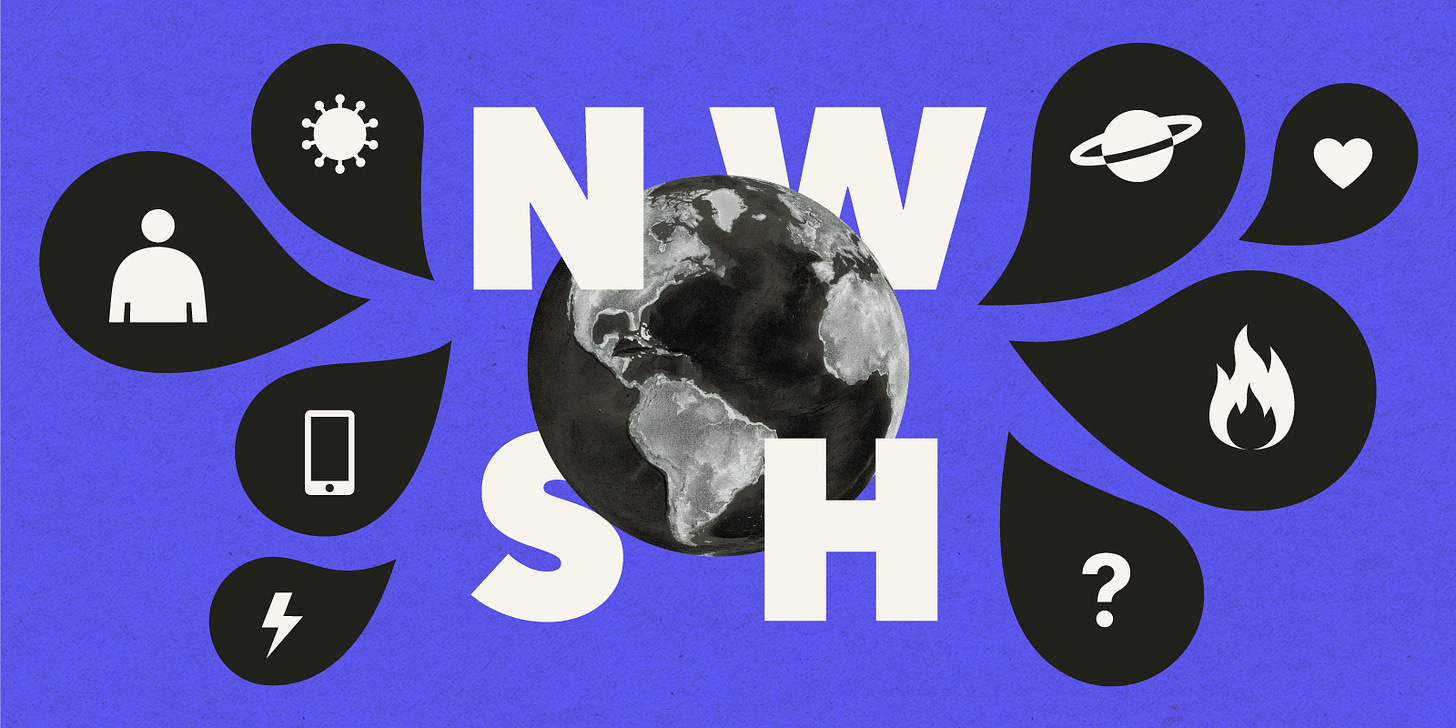New Week Same Humans #62
El Salvador wants to build a new volcano-powered crypto city. Nvidia will use an AI supercomputer to simulate planet Earth. Plus more news and analysis from this week.
Welcome to the mid-week update from New World Same Humans, a newsletter on trends, technology, and society by David Mattin.
If you’re reading this and you haven’t yet subscribed, join 19,000+ curious souls on a journey to build a better shared future 🚀🔮
💡 In this week’s Sunday note I wrote about helper robots and the designs they have on us. Go here to read Our Coming Robot Utopia.💡
This week’s NWSH is brought to you by Thinkific.
The NWSH community – that means you! – has much to teach the world. That’s why I’m delighted that this week’s emails are sponsored by Thinkific.
Thinkific is a platform that empowers users to create, market, and sell their own online courses and membership sites. It takes care of the technology, so you can focus on the important stuff: informing and inspiring those who want to learn from you.
Maybe you’re a content creator, consultant, or coach. You could be an academic, digital entrepreneur, or fitness guru. Whoever you are, if you have knowledge, skills, and experience that you want to share with others – and especially if you’re growing an audience or customer base online – then this platform is for you.
Thinkific integrates with the popular creator tools you’re most likely already using. And it’s already built a thriving community of over 50,000 course creators.
For the millions who attend them, online courses are unlocking a whole new era in learning and development. For creators, they offer the opportunity to build a personal brand and drive new revenue. So ask yourself: what will you teach the world?
To begin
This week, the President of El Salvador announces bold new plans featuring bitcoin, a new city, and a volcano.
Also, tech giant Nvidia put their supercomputers to work to build a vast simulation of Earth. And a new study says parents don’t have much influence over the personality of their children.
Plus, an update on New Year Same Humans: the end of year event I’m hosting for our community.
Let’s go!
💸 Get that coin
This week, El Salvador announced the most radical bitcoin plan ever devised by a national government.
Back in September the country became the first in the world to accept bitcoin as legal tender. But that’s not enough for 40-year-old tech-bro President Nayib Bukele. Speaking at a raucous event over the weekend, Bukele announced plans to build a new Bitcoin City at the base of the Conchagua volcano in El Salvador’s southeastern La Unión region.

Yep, no income or capital gains tax in Bitcoin City; only a form of Value Added Tax (VAT).
In place of tax revenue, the city will draw on geothermal energy from Conchagua to power bitcoin mining and funnel profits back into infrastructure and services. And Bukele wants to kickstart construction with a $1 billion bitcoin bond, which the country will issue in 2022.
‘The city will have everything, says the President, ‘Residential areas, commercial areas, services, museums, entertainment, bars, restaurants, airport, port, rail; everything devoted to Bitcoin.’
⚡ NWSH Take: Okay Bukele, we get it: you’re excited about bitcoin. But while this plan to shackle a new city to a volcano and spew out bitcoin billions sounds a bit Bond villain, it does at least accommodate one powerful truth. That is, every government will soon need to decide upon its approach to cryptocurrencies. // Contrast the news from El Salvador with the noises come out of Europe. Last week, Swedish regulators called on the EU to institute a Europe-wide ban on bitcoin mining in order to help the continent meet its climate obligations. Mining is notoriously energy-intensive, and the total hash rate – a measure of the computing power being used to mine – is skyrocketing after a dip over the summer. Meanwhile, China has already banned cryptocurrencies and India is moving ahead with plans to do the same. // The upshot? A battle between bitcoin true believers and bitcoin refuseniks is set to play at the highest levels across pretty much every jurisdiction. And there will be wild variance when it comes to where each country lands.
🚀 Supercharge yourself!
A quick update on the coming end of year extravaganza: New Year Same Humans: Five Trends to Supercharge Your 2022!
Over 140 professionals – founders, designers, marketers, insight professionals and more – have already claimed their place. 🙌 🚀
On the December 14th at 16:00 UK time, I’ll be sharing five powerful trends set to reshape human behaviours and mindsets in 2022 and beyond. And afterwards, I’ll send attendees a full recording of the event, plus the 60+ slide trend report with even more insights and examples for you to apply.
Typically these pro-grade trend reports sell for hundreds; even thousands. I’m keeping this event accessible to all with a price that has led some friends to question my sanity.
Check it out, and see you on December 14th!
🌐 The revolution will be simulated
Can simulations help us save the planet? This week, tech giant Nvidia doubled down on its view that they can.
Speaking at a Washington DC tech event, CEO Jensen Huang elaborated on plans that he announced a few days before. Nvidia, says Huang, wants to build ‘the world’s most powerful AI supercomputer’ to run a vast simulation of Earth, which will revolutionise our ability to model and understand the climate.
Earth-2 will be a digital twin of our planet, operating at ‘metre-scale resolution’; today’s simulations operate at 10km to 100km resolutions. That means Earth-2 will allow scientists unprecedented powers to forecast weather changes in specific regions, set to occur decades from now.
Earth-2 will build on Nvidia’s Omniverse, dubbed a ‘metaverse for engineers’. And further recent announcements from the company show the role simulations are set to play across industry in the decade ahead.
BMW, for example, is working with Nvidia to build a virtual factory inside the Omniverse, which it will use to model new manufacturing processes.
⚡ NWSH Take: It’s not just Nvidia who are playing with the idea of digital twins. This month Porsche announced a new service that will see new cars matched with a virtual copy; an AI will crunch data fed by sensors on the physical car, and alert drivers when maintenance is needed. // But Nvidia’s Earth-2 project offers a glimpse of the really big prize in sight: simulations of complex systems that we currently find difficult, or impossible, to predict: think the climate, the human body, or large social groups. The ability to accurately forecast outcomes here will be revolutionary; when it comes to climate, it may prove existential. // All this also taps into a well-worn NWSH obsession: the revolution we need to enact in the foresight industry. Back in All Life is Here I wrote about the need for new foresight frameworks that reach beyond individual wants and needs, and accommodate impacts on both the climate and society. We can’t do that with a paper and pen; this revolution must be simulated.
👶 Born this way
This week, a new research paper lends weight to an idea that many parents will have arrived at independently. Children are born with personalities, and there’s not much you can do to change them.
Published by the University of California’s Collabra: Psychology journal, the paper examines the relationship between parenting styles and the well-known big five dimensions of personality, which include agreeableness, conscientiousness, and neuroticism. To do so, it draws on a longitudinal study of 3,880 pupils drawn from 99 schools in Germany.
The TL;DR? ‘Longitudinal Associations Between Parenting and Child Big Five Personality Traits’ concludes there is little relationship between parenting and the big five.
⚡ NWSH Take: What does all this have to do with NWSH? As the name suggests, this newsletter is built around a thesis: that our shared future takes shape when a changing world collides with our shared, fundamental nature. That thesis presupposes that there is such a thing as human nature, an idea that became unfashionable in the second half the the 20th-century and is still opposed in some quarters today. // Critics of the idea believe we are blank slates, shaped mainly by our environment. But this paper adds to growing evidence that calls this into question. Indeed, it points to the idea that not only is there a shared human nature, but that the version of it we each get is more given than learned. In that way, it’s a useful corrective to decades worth of emphasis on environmental influence when it comes to the formation of personality. // If we’re to understand, and shape, our shared future, it’s not enough only to obsess over shiny new technologies. We must also understand ourselves. That means we need more work like this, and we need to integrate into our foresight thinking.
🗓️ Also this week
😬 ConstitutionDAO failed in its bid for a rare 1787 copy of the US constitution, and the aftermath is messy. The DAO needs to refund $40 million to over 17,000 donors; some have discovered that transaction fees will mean they get nothing back.
🚫 The CCP told tech giant Tencent, the parent company of WeChat, that it cannot update existing apps or launch new ones. Officials didn’t put a time limit on the order. I’ve written extensively about the CCP’s crackdown on its domestic tech sector.
🛰️ The Brazilian government says Elon Musk’s Starlink satellite internet service will help monitor illegal deforestation in the Amazon. I’ve given Starlink a hard time over its plans to launch 40,000 satellites in near-Earth orbit, which experts say will ruin our view of the night sky. So it seems only fair that I mention this.
🏃 Niantic, the makers of Pokémon Go, raised $300 million to build ‘a real world metaverse’. CEO John Hanke says Niantic’s AR metaverse can encourage young people to go outside and connect with the physical world.
🌊 Global research firm Ipsos say that climate concern in the UK is at the highest level ever recorded. In its latest survey, 40% of Britons said pollution and climate change are a big issue for the country.
☄️ NASA launched the first ever mission to deflect an asteroid. The Double Asteroid Redirection Test (DART) will see a spacecraft the size of a small car crash into an asteroid called Dimorphos next September.
🧮 AI research company OpenAI say they will soon make their GPT-3 language model available to everyone. Currently, there’s a long waiting list to access the tool. After the change developers will be able to jump straight in.
💡 Albert Einstein’s handwritten notes on the general theory of relativity fetched a record €11.6 million at auction. Published in 1915, the theory revolutionised our understanding of gravity.
🌍 Humans of Earth
Key metrics to help you keep track of Project Human.
🙋 Global population: 7,908,961,502
🌊 Earths currently needed: 1.7974641433
💉 Global population vaccinated: 42.2%
🗓️ 2021 progress bar: 90% complete
📖 On this day: On 24 November 1859 British scientist Charles Darwin publishes On the Origin of Species.
Enter the matrix
Thanks for reading this week.
I’m fascinated by the potential of simulations to bring us new understanding, and new forecasting methods, in the decades ahead.
It’s a story New World Same Humans will continue to track. And there’s one thing you can do to help: share!
Now you’ve reached the end of this week’s instalment, why not forward the email to someone who’d also enjoy it? Or share it across one of your social networks, with a note on why you found it valuable. Remember: the larger and more diverse the NWSH community becomes, the better for all of us.
I’ll be back this Sunday. Until then, be well,
David.
P.S Huge thanks to Nikki Ritmeijer for the illustration at the top of this email. And to Monique van Dusseldorp for additional research and analysis.







